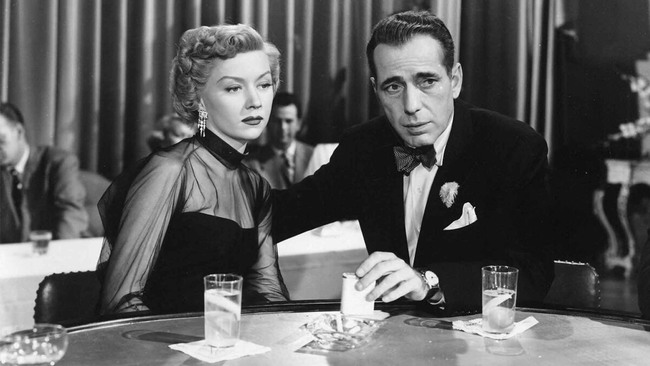Books: In a Lonely Place and More

For the London Review of Books,Gaby Wood writes about Nicholas Ray’s In a Lonely Place (1950) and the 1947 novel it’s based on by Dorothy B. Hughes. “When filming began, Ray was married to its female lead, Gloria Grahame; by the time it ended, they were living apart. Ray said it was ‘a very personal film’—and as parting gifts go, it was both poisonous and immortal.” The novel “is told from the point of view of a serial strangler named Dixon Steele. . . . Hughes, one of very few female crime writers in the noir canon, made it clear that she intended to sidestep the whodunnit in favor of character, and here her focus is on the ways in which women might be seen by a man who ritually kills them. They are viewed through Dix Steele’s eyes as ‘cheats, liars, whores,’ and presented by Hughes as perceptive and tough. Though the crimes are technically solved by an astute male detective, the women are on to Dix first.”
As it happens, the new episode of the Cinematologists (100’17”) focuses on Ray’s In a Lonely Place and features Dario Llinares’s conversation with Julie Grossman, author of Rethinking the Femme Fatale in Film Noir.
Back in the LRB, we find Michael Wood on Guillermo del Toro’s The Shape of Water, “an impressive work, a violent romance rather than a fairy tale,” and Tom Crewe: “The current vogue for digitally colorized historical photographs—well represented by Retrographic: History’s Most Exciting Images Transformed into Living Colour, edited by Michael D. Carroll—is a marker of our level of estrangement.”
Earlier this month, I pointed to Dustin Illingworth’s piece for the Paris Review on Alfred Döblin’s 1929 novel Berlin Alexanderplatz, the occasion being a new translation by Michael Hofmann. Illingworth credits Rainer Werner Fassbinder’s fifteen-hour adaptation in 1980 with introducing “a new generation to Franz Biberkopf’s immortal saga.” Fassbinder goes unmentioned in two other reviews of the new edition, but fans of the series, the book, or both will want to know about them.
Jeff Tompkins for the Chicago Review of Books: “If you’ve ever been skeptical of the way Weimar Germany has been tamed and glamorized in the popular imagination—thanks to Cabaret, to popular detective novels, and, just this winter, a glitzy new Netflix serial, Babylon Berlin—then you’ll appreciate that Alfred Döblin’s novel arrives with a depiction of the real thing, an unsparing account of a society in free fall. The sheer brio of Döblin’s prose, together with the unstoppable forward momentum of his narrative, makes all this squalor not only bearable but riveting.” And Sophie Duvernoy for the Los Angeles Review of Books: “Hofmann’s accomplishment is to reimagine in English how the novel talks, squawks, screeches, and curses in Döblin’s German.”
Also in the LARB, Dan Friedman reviews Vanda Krefft’s The Man Who Made the Movies: The Meteoric Rise and Tragic Fall of William Fox: “From editing scripts to choosing actors; from the use of nationwide marketing campaigns to the standardization and installation of sound reproduction technology; and from choosing movie theater locations to the details of their interior designs, it was Fox, more than any other single human in the first half of the 20th century, who determined what movies you saw and how you saw them.”
“When we objectify Agnès Varda as a harmless granny, we lose perspective of her work,” writes Chelsea Phillips-Carr at PopMatters. “In Rachel D. DeRoo's new book, Agnès Varda between Film, Photography and Art, we get a look at Varda's work beyond popular representations of her.”
Phillips-Carr also reviews Jane Gaines’s Pink Slipped: What Happened to Women in Silent Film: “Starting with feminist film research of the ‘70s, which sought out women in film history, Gaines questions bias and motive. The result is succinct and illuminating.”
For the Guardian,Simon Hattenstone interviews Irvine Welsh, who’s “about to release Dead Men’s Trousers, the fifth novel in his Trainspotting series. Welsh says it will be the final installment (though by the end of the afternoon he’s not quite so sure).”
Michael Caine, who’s just turned eighty-five, will see his memoir Blowing the Bloody Doors Off – And Other Lessons in Life released in October, reports Katherine Cowdrey for the Bookseller.
Filmwax Radio host Adam Schartoff talks with Grady Hendrix, author of Horrorstör and one of the founders of the New York Asian Film Festival, and with Scott Eyman about his new book, Hank and Jim: The Fifty-Year Friendship of Henry Fonda and James Stewart (80’41”).
For news and items of interest throughout the day, every day, follow @CriterionDaily.



